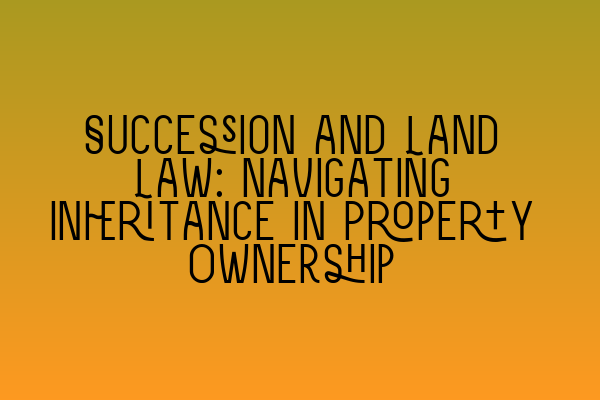Succession and Land Law: Navigating Inheritance in Property Ownership
As a property owner, understanding the complexities of succession and land law is crucial when it comes to inheritance. Whether you plan to pass down your property to your loved ones or you are an heir navigating the intricacies of property ownership, having a solid grasp of this area of law is essential. In this blog post, we will delve into the topic of succession and land law, providing valuable insights to help you navigate the process seamlessly.
Succession, in the context of land law, refers to the transfer of property ownership from one individual to another upon their death. This transfer can occur either through a valid will or in accordance with the laws of intestacy in cases where no will exists. In either scenario, it is important to understand the legal frameworks and requirements governing succession to ensure a smooth transition of property ownership.
One of the key factors in navigating inheritance in property ownership is understanding the different types of interest that can be held in land. These include freehold, leasehold, and equitable interests, among others. Freehold is the most extensive type of interest, granting the holder full ownership rights over the property. Leasehold, on the other hand, grants a limited interest in the property for a specific period of time, usually through a lease agreement. Equitable interests refer to rights that are recognized in equity but may not be explicitly protected under common law. Having a solid understanding of these interests is crucial in determining the extent of inheritance rights and obligations.
When it comes to passing down property through a will, it is important to ensure that the will complies with the formalities required by law. These formalities may include the testator being of sound mind, the will being in writing, and the inclusion of the testator’s signature and witnesses. Failure to adhere to these formalities can lead to the will being declared invalid, potentially causing complications in the succession process.
In cases where no valid will exists, the laws of intestacy come into play. These laws establish a default framework for distributing property among heirs based on their relationship to the deceased. It is important to note that the laws of intestacy may not align with an individual’s wishes, underscoring the importance of creating a valid will to ensure that property is distributed as intended.
Additionally, it is worth considering the impact of inheritance tax on property ownership. Inheritance tax is a tax levied on the value of an individual’s estate upon their death. Depending on the value of the estate and the relationship between the deceased and the beneficiary, different tax rates and exemptions may apply. Understanding the intricacies of inheritance tax and seeking professional advice can help minimize the tax burden and ensure a smooth transition of property ownership.
Navigating succession and land law can be complex, and seeking professional legal advice is highly recommended. A solicitor who specializes in property law and land law can provide expert guidance and help ensure that all legal requirements are met in the succession process. They can assess the specific circumstances surrounding the property, draft legally sound documents, and guide you through the intricacies of inheritance tax.
At SQE Property Law & Land Law, our team of solicitors specialize in all aspects of property law, including succession and land law. We have extensive experience in assisting clients with their inheritance matters, ensuring a seamless transfer of property ownership. Contact us today to schedule a consultation and let us help you navigate the complexities of succession and land law.
Related Articles:
– SQE 1 Practice Exam Questions
– SQE 1 Practice Mocks FLK1 FLK2
– SQE 2 Preparation Courses
– SQE 1 Preparation Courses
– SRA SQE Exam Dates
In conclusion, understanding succession and land law is crucial when it comes to navigating inheritance in property ownership. By familiarizing yourself with the legal frameworks, formalities, and tax implications, you can ensure a smooth transition of property ownership and safeguard your interests. Seek expert legal advice from a solicitor specializing in property law to guide you through the process and provide the necessary support. At SQE Property Law & Land Law, we are here to help you navigate succession and land law, ensuring that your property remains a valuable asset for generations to come.
